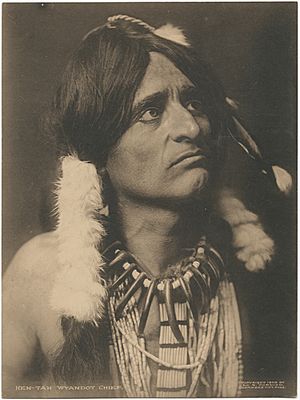Bertrand N. O. Walker facts for kids
Quick facts for kids
B. N. O. Walker
|
|
|---|---|

Walker as Hen-Toh (1909)
|
|
| Born |
Bertrand Nicholas Oliver Walker
1870 |
| Died | 1927 (aged 56–57) |
| Nationality | Wyandotte |
| Other names | Hen-toh |
| Occupation | Writer, Clerk |
Bertrand N. O. Walker (1870 – June 27, 1927), who published under his Wyandotte name Hen-Toh, was an American Indian author of poetry and folktales best known for two books, Tales of the Bark Lodges (1919), and Yon-Doo-Shah-We-Ah (Nubbins) (1924).
Biography
Walker was a member of the Oklahoma band of the Big Turtle Clan. Born in Kansas City, Kansas, he was born around 1870, the youngest of eight children.
Walker was a descendant of William Walker (1800 - 1874), the Wyandotte leader who served as the first provisional governor of Nebraska Territory, which also encompassed the present-day state of Kansas. Originally given another Wyandotte name, he adopted the name "Hen-Toh" (he leads), which was once borne by his relative, Chief John W. Greyeyes (1820 – 1881).
In 1872, his father Isaiah Walker (1826 - 1886) moved from Kansas to Indian Territory, building a house in what is now Wyandotte, Oklahoma, that is listed in the National Register. Walker attended a Friends’ Mission School near Wyandotte that was later renamed the Seneca Indian School. From 1890 until his death in 1927, he worked in the Indian Service, first as a teacher and then after 1901 as a clerk in Kansas, Oklahoma, California, and Arizona. Between 1918 and 1923 he focused on writing and maintaining the family farm. In 1923, he took a position with the Quapaw Agency in Miami, Oklahoma, serving there until his death.
Writing
Walker read widely, and gathered folktales from older members of the Wyandotte, including Catherine "Kitty" Greyeyes (1822 - 1885), the wife of John W. Greyeyes. The Canadian ethnologist Charles Marius Barbeau credits Walker for facilitating his work on Huron and Wyandot Mythology (1915): "The author is much indebted to Mr. B. N. O. Walker not only for the valuable myths which he contributed ... but also for his many services in facilitating the work with other informants, by whom he is deservedly esteemed."
As Hen-Toh, Walker published two books, both issued by the Harlow Publishing Company in Oklahoma City. Tales of the Bark Lodges (1919), a collection of twelve stories, and Yon-Doo-Shah-We-Ah (Nubbins) (1924), a volume of poetry, chiefly character sketches and narratives. He also published in the Indian School Journal, Chronicles of Oklahoma, and other periodicals. Many of his folk-tales and poems are written in what he described as "the broken dialect peculiar alone to the 'old time Indian.'" As Daniel F. Littlefield and James W. Parins have noted, "Hen-Toh's close contact with old Wyandots had provided him a familiarity with not only Wyandot history and culture but also the rhythms of their English speech."
Despite his slim output Walker's work has been widely anthologized, most fully in Robert Dale Parker's collection of American Indian poetry published before 1930, Changing is not Vanishing (2010). In 2022, the proprietor of Carpe Librum, an antiquarian bookseller, discovered a substantial archive of unpublished manuscripts by Walker. According to the bookseller, the archive, which includes 30 poems and 20 stories, "more than doubles the known corpus of writings by B. N. O. Walker." The archive was sold to a research library.
In popular culture
- The photograph by George Bancroft Cornish titled "Hen-Tah, Wyandot Chief" is a portrait of Walker in 1909. Cornish, who specialized in images of Native Americans and the West, misspelled Walker's name ("Hen-Tah" instead of "Hen-Toh"), and misidentified him as a chief. Another portrait by Cornish, probably taken at the same sitting, appears as the frontispiece to the original edition of Yon-Doo-Shah-We-Ah.
- A portrait of Walker by Acee Blue Eagle (1907-1959) appears in the set of Famous Oklahoma Indians glassware produced by the Knox Oil Company in 1959.
- A story by B. N. O. Walker was adapted in comic form as "A Prehistoric Race," with a script by Tom Pomplum and art by Tara Audibert.

